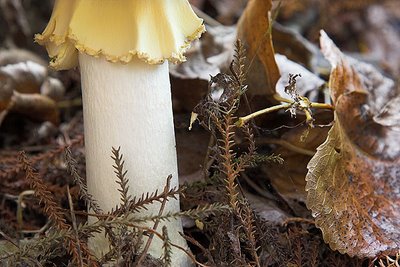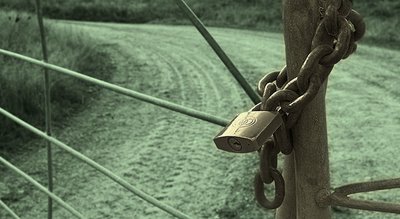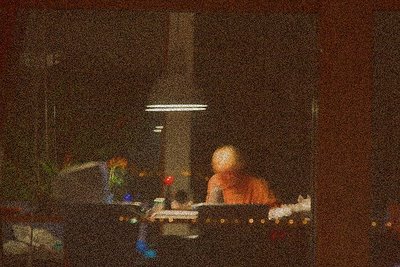Too long, and I’m not sure why. It’d be easy to blame the weather—particularly the winds, which have seemed so often to come from the wrong quarter—but perhaps it’s simpler than that. Perhaps I’ve been away too much. Out in the evenings, watching films, meeting friends, exploring ideas. Maybe I simply haven’t been here for many of the good evenings when I could have sat out here, doing nothing in particular and so much that matters. In the last 4–5 months, I’ve been elsewhere a good quarter of the time—in the Ruahine; down Wellington way; in the South Island. I regret none of it, but now summer’s gone; autumn’s beginning to stretch its shadow across the land towards winter and it’s likely I’ll have few of these evenings left to enjoy. I’d like to share them with friends; here, squinting across the paddock into the sun, at the backlit trees on the terrace edge—the slow-turning leaves of black locust and the apple, the never changing foliage of manuka. Watching thistledown drift like lost feathers on a sea of light; the flickering flight of swallows; a hawk heading somewhere after another day’s floating and spiralling and scanning, falling and rising.
it’s simpler than that. Perhaps I’ve been away too much. Out in the evenings, watching films, meeting friends, exploring ideas. Maybe I simply haven’t been here for many of the good evenings when I could have sat out here, doing nothing in particular and so much that matters. In the last 4–5 months, I’ve been elsewhere a good quarter of the time—in the Ruahine; down Wellington way; in the South Island. I regret none of it, but now summer’s gone; autumn’s beginning to stretch its shadow across the land towards winter and it’s likely I’ll have few of these evenings left to enjoy. I’d like to share them with friends; here, squinting across the paddock into the sun, at the backlit trees on the terrace edge—the slow-turning leaves of black locust and the apple, the never changing foliage of manuka. Watching thistledown drift like lost feathers on a sea of light; the flickering flight of swallows; a hawk heading somewhere after another day’s floating and spiralling and scanning, falling and rising.
It’s hard during the week, though. It’s not far to drive from town to here, but far enough; for friends faced with the prospect of work the next day, a relaxed verandah session has to compete with a decent sleep and it’s easy to say, “let’s leave it for the weekend” —usually meaning Saturday. One day of seven. It seems wrong. A life is so precious and so ephemeral that to waste any of it seems an unbearable tragedy. No—it is an unbearable tragedy. Yet so many of us do bear that tragedy; most days getting up reluctantly and heading off to a job we don’t like; a job where we’re stressed; most importantly, a job that seems largely trivial and unimportant, without real meaning.
What can be done? Well, you can either change your circumstances or change the way you think.  Occasionally, changing your circumstances—for example, switching jobs, moving elsewhere—can work. Often it doesn’t. Conversely, changing how you think can always work—the catch is that it’s far harder. All I can say, from my own experience, is that it gets easier with practice.
Occasionally, changing your circumstances—for example, switching jobs, moving elsewhere—can work. Often it doesn’t. Conversely, changing how you think can always work—the catch is that it’s far harder. All I can say, from my own experience, is that it gets easier with practice.
I notice a movement down near my bare feet. A little jumping spider, the house hopper Euophrys, swivels to face me. He lifts his head and the effect is remarkable—I swear he’s looking up at me, staring me in the face. Can he see that far? What does he see? What’s he thinking? How do spiders think; what’s it like to be a spider? These are questions curious kids ask and adults don’t know how to answer. I stay very still, looking back at him, trying not to stare too hard. He moves forward a little, towards my big toe. When he stops, it’s a perfect pause as if time itself has hesitated; only the flicker of his tiny white palps counters the effect. Another slight forward movement, then he jumps, quick and nimble, onto my toe. He’s so small and light I feel nothing; those eight little legs tiptoeing over my huge, clumsy toe don’t even register. He makes a small jump onto the next toe, then, presumably deciding it’s a poor hunting ground, hops back down to the verandah. I feel blessed.
Returning to that sad thought about how so much life gets wasted, I think about the recent sale of the NZ online auction, Trade Me, and the response to that news. Trade Me sold for about $NZ 700 million and the news was full of the story of cofounder Sam Morgan, who, only a few years ago, was a trying to keep warm in a shared flat.  Now he’s banked something between $200–300 million and is fielding numerous offers of marriage.
Now he’s banked something between $200–300 million and is fielding numerous offers of marriage.
Good luck to him. I have no complaints about Sam—what disturbs me is the sort of thinking (if that’s not too generous a word) the story has encouraged. Suddenly it seems everyone wants to know how he did it so they can do it too. That, or something equally successful. The tragedy is that, yet again, success is measured as money. Sam’s either hailed as a hero to emulate or he’s envied because, well, he got rich quick. That’s what’s considered significant; that’s what we should strive for. What seems to have been ignored or downplayed, even when Sam pointed it out himself, is that he enjoys what he does. To me, that’s his real success.
I wonder: what if we all found a way to make $200 million within a few years? Would we be happier? Would our society be better?On a terrace on the far side of the river a stag roars: a deep, drawn-out groan full of lust and aggression. They’re at it up in the hills too, wandering about, setting up territories, herding hinds, challenging interlopers. In that state they’re easier to hunt, more vulnerable, and the hills are full of blokes with loaded rifles and adrenaline. Autumn: season of mists and mellow fruitfulness my arse. It’s hormones and testosterone poisoning here.
I sit back in the old chair with its sun-rotted fabric and watch a silhouetted magpie hunched sharp and dark on the power line. It lifts a wing and nibbles its armpit, ruffles its feathers and hunches back down. What’s necessary for success? What does it take to be happy?
Not much, I reckon.
There is no greater sin than desire
No greater curse than discontent,
No greater misfortune than wanting something for oneself.
Therefore he who knows that enough is enough will always have enough.
— Lao Tsu: Tao te ching (46). Translated by Gia-Fu Feng and Jane English (1972). Vintage Books edition 1989. ISBN 0-679-72434-6.
Photo 1: Amanita muscaria on the bank of Te Awaoteatua Stream, Pohangina Valley.
Photo 2: Keep out. If you know me, you know what symbols like this mean to me.
Photo 3: Writing. Based on a photo of a reflection in double glazed windows, when I was minding a house, two cats, and an indeterminate number of mice, one of which lived in the TV. The string of lights near the bottom isn't a reflection; it's the Hutt motorway, leading to Wellington City on the far side of the harbour.
Photos and words © 2006 Pete McGregor
18 comments:
You've given us some food for thought there Pete!
Changing the way you think is the key, I remember when I was getting severely stressed from the pressure of work and trying to do too much, finally I backed off, gave myself a good talking to, and cruised through the last years to retirement, still doing a good day's work, but much easier in the mind.
Back in 1995, for our honeymoon, my wife and I decided to leave everything behind and set off on bicycles traveling around Europe for six months. We sold or threw away almost everything... all we had were the things we carried on our bicycles. What shocked me (less so my Brazilian wife) in the beginning was my complete ignorance of how to use uninterrupted blocks of time. For the first three weeks we pushed ahead (with mostly me doing the pushing) as if running a race; I kept a schedule and a list of places we had to visit, getting antsy when we fell behind in our distances, feeling shortchanged when our bodies couldn't keep the pace. Finally, just into Germany, exhausted and stressed, my wife and I got into a big argument about having to push on so hard.
In the ensuing silence my wife asked, "We have six months. Why are you in such a hurry?"
That stumped me. I had never thought about six months before. "I don't know. I was just doing things the way we did in Japan all the time... getting the most out of our weekends"
"It's six months," she repeated. "Six whole months."
I gazed out at the rolling hills, the clouds drifting through an azure blue sky, felt the wind, and suddenly everything stopped. Time stood still. In fact for six months there was no time.
The months that followed were some of the most immediate, most powerfully present, most human moments in my life. We discovered just how little people need to enjoy each day and survive. We learned that the sky is our natural ceiling and that our bodies could get hard and tough beyond what we ever imagined. We learned to sit still for hours in silence or let our minds wander during the long stretches between towns on the bicycles. And we discovered that 24 hours is just the right amount of time to do all that needed being done... in fact it was more than enough.
Now I am back in Tokyo and have been yearning to return to that state of living somehow. So much of living in a city like Tokyo is like carrying around a scale, each little added trinket helps to weigh down the entire plate. I'm seeking a new place to begin over again. New Zealand has long been on my mind, as are Australia, Canada, and possibly Sweden, places where I feel it is possible to find a good balance.
Great questions, Pete, and beautifully posed.
Brilliant, Pete.
I have a little sign on my desk, "Never confuse having a career with having a life." Attitude depends on perspective.
I haven't even finished the post but wanted to linger with this line: "a hawk heading somewhere after another day’s floating and spiralling and scanning, falling and rising..."
I am so struck by these questions. When I was young, in my 20s, I remember saying to my parents "I don't want to make a living, I want to be a living." I "dropped out" bought ten acres of land, built a cabin, and tried to make it out there. Unfortunately, I wasn't successful at that time, but I never lost the longing to slow down and look around, and took the chance 30 years later. We have stopped working and are learning to live with much, much less. It is do-able. The view from your verandah goes very far, Pete, very far. I like to think when we stare off into the distance, from wherever we are, we are all looking at the same horizons.
Love that Amanita muscaria. Beautiful photograph of it.
Duncan: Yep, exactly. How you think is the key. We're not slaves to our circumstances. I'll also add that, judging from your blog, you didn't retire — you rejuvenated!
Butuki: That says it beautifully. I often think that my greatest appreciation of my life is when time ceases. It's such a common thing to think of life as linear, moving relentlessly forward, but some years ago I decided a better way to think of my life was as a tapestry (sorry about the cliche) — living is not a process akin to reeling in a line, but more like enrichment. Thanks for those beautifully worded thoughts.
Cheers Brenda. There's nothing original in the thoughts — they've been said many, many times before (for example, by Lao Tsu). Sadly, many people need to be constantly reminded of those ideas.
Nuthatch: You're right; and from the other perspective, it's sad so many people let their perspective determine their attitudes. However, I have been encouraged by the recent trendiness of "work-life balance". Let's hope it isn't just another management fad.
Thanks Ariel, nice to have those words appreciated :^D
RD: Yes, it is do-able. It's one of the reasons I and so many others keep coming back to the Dharma Bums: for affirmation that it is, indeed, do-able. Thanks :^D
i had mice like that once! mine lived *somewhere* in the oven. i used to think of it as their sometimes centrally heated, multi-storey apartment building. i humoured them for a brief period - i mean, you have to admire the resourcefulness - and then got ruthless.
You got ruthless? Oooh... that sounds grim. You turned the oven on? ;^D
Actually, if you want a definition of "success", you don't need to look much further than mice.
Here's to happiness, Pete. Thanks for sharing your deck time :-)
Thanks Anita :^D
turned the oven on? no, they were too smart to actually reside 'in' the oven. i think the solution best remains un-described.
A beautiful piece of writing, Pete. Poignant, thoughful and observant - with photos that complement it perfectly.
And I am enjoying getting to know New Zealand through your posts ...
I appreciate those thoughts, Mary, and I'm glad you're learning a bit about NZ.
:^D
I thoroughly enjoyed this post, Pete. It speaks to how my way of thinking (trying to slow down and appreciate the small wonders of life) conflicts with the idea of "bigger, faster, more" that somehow defines success.
And, it's interesting to hear an evocative description of autumn at this time when in my hemisphere I am thinking spring!
Thanks Deb. I guess if we do strive to live that appreciative way we inevitably encounter the conflict with our dominant economic system, which demands "growth". However, that sort of growth may mean "bigger, faster, more", but I'm pretty sure it desiccates the spirit.
Curious: after I wrote how we're racing into autumn here, we've had mild, comfortable days and I've managed to get out on the verandah a fair bit. Not that I'm complaining... :^D
It's strange to read of your heading into fall as our sun climbs higher and higher into the sky. Even at midnight we now have a glow on the northern horizon, offering a promise of our 24 hour light just around the corner.
I wonder if your stag's roar is anything like our elk's bugle, quintessentially Fall's sound for me (well not me here per se, but me in general).
Well no time, got to run. Working on my first $200 million.
Clare: we have elk in Fiordland (we use "wapiti" rather than elk). Their bugle is very different from a red stag's roar, which is indeed very much a roar roughly similar to that of a big cat. Deep, hoarse, resonant; like someone groaning into a length of drainpipe.
Good luck with the $200 million.
;^>
Post a Comment